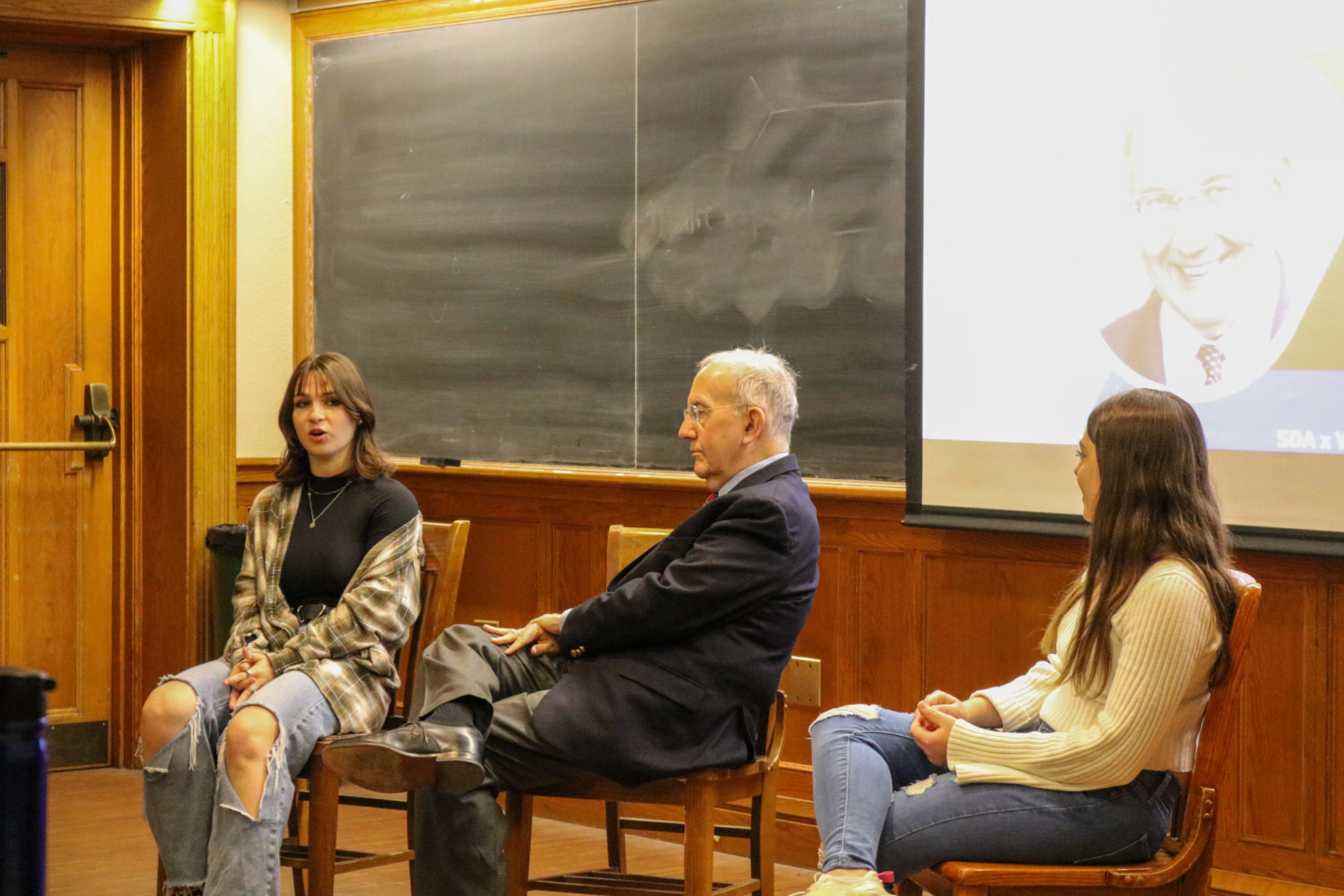10 years after Sandy Hook, student advocacy groups reflect on the shooting’s impact
Sandy Hook survivor Ashley Hubner and Connecticut elected officials joined SDA and Yale Dems to discuss the long-term effects of gun violence and legislation since the tragedy.

Abraham Payne, Contributing Photographer
High school senior Ashley Hubner still remembers where she was on Dec. 14, 2012 — crying while searching the hallways for her 5-year old sister after the Sandy Hook shooting.
When Hubner was 7 years old, she witnessed a deadly mass shooting at Sandy Hook Elementary School in Newtown, Connecticut. Yale Students Demand Action and Yale College Democrats hosted Hubner and Connecticut State Senator Martin Looney for a talk entitled “Ten Years Since Sandy Hook: Reflections on the Gun Violence Prevention Movement” on Dec. 8. U.S. Senators Richard Blumenthal D-Conn. and Chris Murphy D-Conn. submitted a pre-recorded message in advance of the event.
“What started with a day like any other…my innocence and my life altered forever,” Hubner said. “I would no longer feel safe in my bedroom at night, I would no longer hear a loud noise without thinking about bullets. And I would never again think about my childhood without first thinking about the shooting. I was traumatized.”
Though Hubner was the only attendee present for the Sandy Hook shooting, all Connecticut residents have felt its effects. Looney said that everyone could remember where they were on the fateful day of the Sandy Hook shooting.
“Every report that came in was worse and worse than the one that came in before,” Looney said. “The Governor…headed down to [meet with] families and tell them that their child was not coming back.”
Looney described the tragedy’s impact on the next year’s legislative session. For the first time in his tenure, he recalled that state officials did not vote on the budget first — instead, legislators focused on passing policies to deal with the lingering effects of gun violence.
A moment of bipartisan unity followed the shooting, Looney said. The Connecticut state legislature passed a gun control bill with both parties’ support in 2013. Earlier this year, Murphy joined SDA and Yale Dems to honor the anniversary of the Parkland shooting.
Since then, Murphy has led the charge to pass June’s landmark Bipartisan Safer Communities Act, which enhanced background checks for those below the age of 21 and funneled federal money into bolstering mental health programs. According to Murphy, the Act is already saving lives.
According to Murphy, the Federal Bureau of Investigations told him that “dangerous individuals … would have gotten a gun, if not for the bill that we passed.”
Blumenthal and Murphy both agreed that while significant, life-saving progress has been made, there is still more to be done.
“So we have made advances, for example, in preventing assault weapons, but we need such a ban at the national level against ghost guns, as well as assault weapons, high capacity magazines, [and] a better background check system [for] safe storage,” Blumenthal said.
Sari Kaufman ’24, a co-founder of Yale’s chapter of Students Demand Action, echoed these sentiments, highlighting that mass shootings make up less than one percent of all homicides.
“Thanks to the countless gun violence prevention activists across the country, there has been major progress since the Sandy Hook Shooting, however, there is still much more to do,” Kaufman said. “[SDA] will continue to work on preventing gun violence, not only mass shootings but everyday gun violence.”
Kaufman herself is a survivor of the 2018 shooting at Marjory Stoneman Douglas High School in Parkland, Florida.
SDA plans on working on community-based violence intervention programs to draw further attention to and reduce gun homicides and assaults.
“Reducing gun violence has long been a priority in all parts of our work as an organization,” wrote Josh Guo ’24 in a statement on behalf of Yale Dems, “whether it be through advocating for violence prevention legislation in the Connecticut General Assembly, or supporting electoral candidates who recognize the importance of action against gun violence.”
Theo Curtis ’25, an attendee, was drawn to the conversation because of Hubner’s “powerful testimony” and “intimate connection” to the issue.
The words of gun violence survivors continue to inspire the fight for reform.
“We will all learn and be empowered to continue fighting for gun violence prevention on local, state and federal levels,” Guo said.
The Bipartisan Safer Communities Act was signed into law by President Joe Biden on June 25, 2022.







